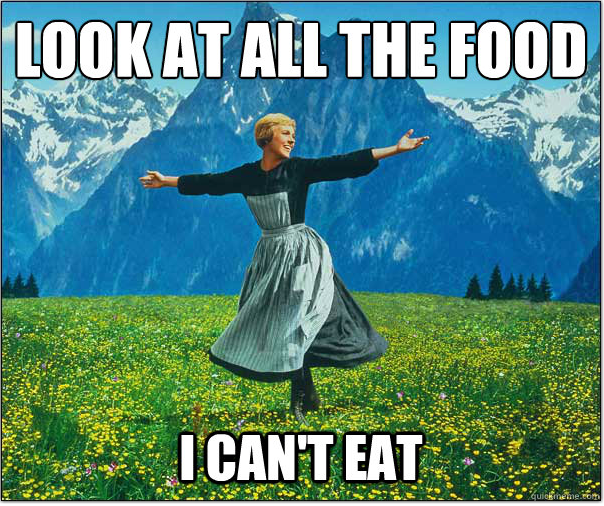Like grains? So do I, but I don’t eat them because I believe they’re objectively not great for optimal health and just feeling good. I’ve experienced a host of positive changes in my body since I stopped eating them more than a year ago (except for the odd bowl of oats and an occasional helping of white rice). But if you’re lifting heavy and you’re thinking about dropping or heavily limiting grains, where are you gonna get those carbs? I’ll tell you where.

The holy sextet. Clockwise from top: kabocha squash, cassava, sweet potato, white potato, yellow plantain. Yam not pictured.
1. Cassava a.k.a. yucca a.k.a. manioc.
With a whopping 38g carbs per 100g serving, cassava is the king of natural, unprocessed, unrefined carb sources. It’s packed full of starches that go to replenishing muscle glycogen, and contains very little sugar. I personally love its dryish texture. Make sure to peel it, cut into large chunks, then boil it until fork tender. Cooking is very important because it contains cyanide-containing compounds that are destroyed in the process. I like to boil mine in salted water, drain and just eat like that, or dip in mayo mixed with sriracha, fresh lime juice, cumin and chili powder.
2. White potato
The classic. A 100g serving contains around 31g carbs, almost 85% of which is starch and the rest of which is fiber and a little sugar. I’m about easy, so I just wash it with soap (organic potatoes are better), pierce with a knife, microwave on high for 3-4 mins and eat out of hand like an apple.
3. Yam (not in photo)
Don’t get it twisted: yams and sweet potatoes are not the same thing; yams contain more starch and virtually no sugar. At 27g carbs per 100g, yams get you those killer carbs you need to replenish after a session of big, heavy compound lifts. Pierce with knife a few times and microwave on high for five minutes or until tender.
4. Plantain
I prefer yellow ones, but they do contain more sugar and less starch than the less ripe green version. Yellows contain around 30g carbs per 100g, about half of which is sugar (I don’t pay much attention to sugar content if the food is whole and completely natural without any refinement. Processed sugar and sugar naturally occurring in whole foods affect me in two totally different ways). They have an earthy-sweet-tart flavor that’s totally unique to them. Plantains must be cooked (unless completely black). The easiest way is to trim the ends off, pierce through the skin a few times with a knife, wrap in a damp paper towel, and microwave on high for three minutes. Once cooked, remove peel. I like to slice into 1/2″ discs, toss with butter and sprinkle with a little salt. It’s my favorite snack right before bed.
5. Sweet potato
The dessert tuber. 100g of sweet potato has around 21g carbs, only around 35% of which is starch, with another 30% as sugar and a decent hit of fiber. While it’s not as effective for glycogen restoration as king cassava or the white potato, it’s great for fat loss, because it makes you full with a relatively light weight to calorie load. Pierce with a knife, microwave on high for five minutes or until tender.
6. Winter squash (butternut and kabocha)
Ok, you’ll have to eat a lot of kabocha to get a lot of carbs, but that’s only because it isn’t a calorie-dense food. Virtually all of the calories it does have come from carbs. It’s about a 50-50 split between starch and sugar, but you can eat an absolute sh*tload of it without breaking 200 calories. It’s another great fat loss option because it’s so filling, nutrient dense, and calorie poor, and lets you get some carbs in. My favorite way to prepare is to cut in half (need large sharp knife and strong arm), gut seeds, peel, cut into ~1-inch cubes, toss in coconut oil, kosher salt and cinnamon and roast at 400 degrees until tender (around 35-40 mins). The texture is soft/ fluffy/ pillowy and the taste is sweet.
Butternut squash is another winner–higher in calories than kabocha and packing three times the carbs with less sugar, it’s a very good non-grain carb option (10g carbs per 100g serving, two of which come from sugar). Same preparation as kabocha.
